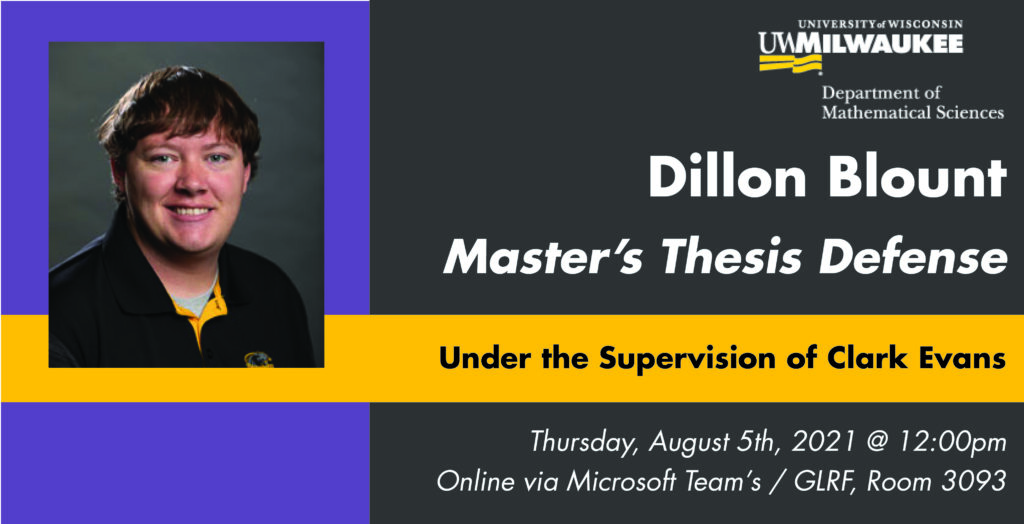
- This event has passed.
Master’s Thesis Defense: Dillon Blount
August 5, 2021 @ 12:00 pm - 2:00 pm
Free PLEASE NOTE: Due to the COVID-19 Pandemic, this event will be held both in-person at a limited capacity and online. Listed events will include a link below in which one may access the Online webspace.
PLEASE NOTE: Due to the COVID-19 Pandemic, this event will be held both in-person at a limited capacity and online. Listed events will include a link below in which one may access the Online webspace.
To view Mr. Blount’s defense online, enter his Online webspace via Microsoft Teams— it will open at 12:00pm on Thursday, August 5th, 2021. This event will be held at the Great Lakes Research Facility (GLRF), Room 3093 starting at 12:00pm if you wish to attend in-person.
Environmental-Regime–Stratified GFS Short-Range Vertical Sounding Forecasts
Mr. Dillon Blount
University of Wisconsin-Milwaukee
Graduate Student
In recent years, the United States’ operational global numerical weather prediction model, the Global Forecast System (GFS) has been upgraded to include a new dynamical core and an updated turbulence parameterization. This updated turbulence parameterization uses a hybrid eddy-diffusivity, counter gradient, and mass-flux formulation to approximate near-surface turbulent vertical mixing. The formulation used is based on the local stability, eddy-diffusivity (stable), counter gradient (weakly unstable), mass flux (moderately/strongly unstable).
In this study, an objective classification of environmental regimes is used to verify the GFS short-range vertical soundings, primarily in the planetary boundary layer where the turbulence parameterization plays an important role. Observed temperature and dewpoint temperature from 15,488 soundings taken at 0000 UTC and 16,118 soundings taken at 1200 UTC between May – November 2019 are first interpolated into a height above-ground-level (AGL) coordinate and normalized to the psuedoadiabat defined by the surface-based parcel’s wet-bulb temperature. This allows for soundings shapes to be classified together regardless of their temperature and dewpoint temperature differences due to climate. A multivariate empirical orthogonal function (EOF) analysis is then performed on the normalized sounding data, after which a k-means clustering analysis is conducted on the leading two principal components retained from the EOF analysis. The output of this analysis classifies soundings into three different environmental regimes, leading into a regime-specific model sounding verification. This study finds environments such as a deeply mixed-layer (strongly unstable), a shallow mixed-layer (weakly/moderately unstable), and radiation inversions (stable), and each profile has varying biases due in part to turbulent mixing issues within the boundary layer.
Committee Members:
Dr. Clark Evans
Click here to view the event flyer.
